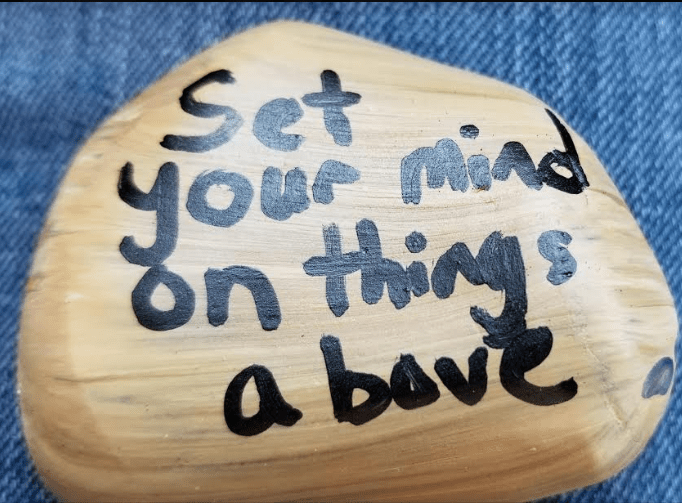589
Rebuilding a Temple of PRAISE, 14SEP
Ah – I love the internet – that lyric “And these are the days of Your servant David, Rebuilding a temple of praise.” From “Days of Elijah” sparked a question in my head and my education was in simple reach of my fingertips… that is an awesome resource of God – the people who fill the internet with scripture (instead of cat videos) are rebuilding their own temple of praise… and the song also was written to say that we too have to stand up against the evils of the world like Elijah did – these are the days that we are to “stand up and speak up for Him.”
I knew David’s son built the big temple – but I had forgotten (and found myself scarcely educated) on the fact that David had the Ark under a tent so that he could worship God – and that David had BUILT A TEMPLE OF PRAISE – actually rebuilt it (learning thru this readings below)… David could not enter the temple of Moses (and only a select few could) – so he made a temple of praise FOR praise – for everyone… So, before Indiana Jones found the Ark in time for the movies, LOL, the Ark of the Covenant (containing all those great God goodies) simply was under a tent – no matter the simple tent – it was all about the praise…
*** That’s us too!!! We are to build, and rebuild, and rebuild again our own temples of praise – find our place for reflection, find our own figurative tent, and find our place to praise the Lord – this also gave way to the saying/lyric “Sacrifice of Praise” – send up the praise – spend the time in praise – and spend the time in rebuilding our own temple – we are human – we are flawed – but when we invite the rebuilding our own temple of praise, God fills us – Jesus heals us – the Spirit moves us…. One of the commentaries below says: “When things do not go as we planned—when God closes a door—we should continue to praise the Lord and then move on in a new direction. Rather than complain about what we can’t do, we should do what we can, giving God the glory. “
Everyone can worship the Lord – everyone can build their temple of praise – everyone can do something to make a difference – and that is what we should do – truly we are blessed to be able to do that! – and we, like in the Days of Elijah, must stand up for God!!!!
AMEN!
Here are good internet reads and some of their text:
“Firstly the song came from watching a television “Review of the Year” at the end of 1994. This was the year of the Rwandan civil war tragedy which claimed 1 million people’s lives, and also when the first ceasefires in N.I. were declared. On this TV review were a lot of daft stories, happy stories, serious stories, and then absolutely devastating stories like the Rwandan situation. As I watched the review unfold I found myself despairing about the state of the world and, in prayer, began asking God if He was really in control and what sort of days were we living in.
I felt in my spirit that He replied to my prayer by saying that indeed He was very much in control and that the days we were living in were special times when He would require Christians to be filled with integrity and to stand up for Him just like Elijah did, particularly with the prophets of Baal. “These are ‘Elijah’ days”. Elijah’s story is in the book of Kings and you can read how he felt isolated and alone in the culture in which he lived. But God told him to stand up and speak for Him.
———-
“Of course David didn’t get to build the structural temple (that’s why the word in the song line is “rebuild”), that was left to Solomon his son, but David was used by God to introduce a revised form of worship, praise and thanksgiving into, firstly, his little tent which he pitched around the Ark of the covenant (the presence of God) and then the temple that Solomon his son built.
This worship, unlike the Mosaic Tabernacle, involved many people being able to come into Gods presence and worship him openly. (In Moses time only one man, the high priest, could enter the Holy of Holies, once a year. David’s tent was a picture of how Christ would enable us to come right into Gods presence, through his sacrifice, and worship openly there).
If you search carefully through the Book of Amos (chapter 9) you will find reference to this “Restoration of David’s Tabernacle”. In Acts this prophecy was used to explain, at the council of Jerusalem, why the “Gentiles” should be allowed to become Christians and worship their saviour without all the legal requirements of the Jewish law. It is also accepted among restoration theologians that this refers to restored Praise and Worship. The physical temple was “Solomon’s”, David’s “temple” was a little tent but you and I are the Temple of the Holy Spirit. It sounds complex, doesn’t it, but if you just understand that the line in the song refers to Praise and Worship before the presence of God just like David enjoyed, then that’s all there needs to be to it!”
———
“After David became king, he decided to move the Ark of the Covenant to a tent set up in Jerusalem — called the Tabernacle of David (see also 1 Chronicles 16) instead of returning it to the Tabernacle of Moses.
16 Then it happened as the ark of the Lord came into the city of David that Michal the daughter of Saul looked out of the window and saw King David leaping and dancing before the Lord; and she despised him in her heart.17 So they brought in the ark of the Lord and set it in its place inside the tent which David had pitched for it; and David offered burnt offerings and peace offerings before the Lord.18 When David had finished offering the burnt offering and the peace offering, he blessed the people in the name of the Lord of hosts. 19 Further, he distributed to all the people, to all the multitude of Israel, both to men and women, a cake of bread and one of dates and one of raisins to each one. Then all the people departed each to his house. (2 Samuel 6:16-19 NASV)
Though the Ark of the Covenant was now in Jerusalem, the priests continued making sacrifices at the Tabernacle of Moses (1 Chronicles 16:37-40).
David deeply desired to be in God’s presence, but he couldn’t do it at the Tabernacle of Moses because of his illegitimacy. But he could do it, if he moved the Ark of the Covenant to a different location and different home. And despite one glitch (2 Samuel 6:6-7), the move had God’s approval.
At the Tabernacle of David, King David now had full, free access to God’s Presence. Further, there was no veil separating people from Ark of the Covenant, as there was in Moses’s tabernacle.
Everyone could come before God’s Presence at this simple tent.
Many of the Psalms were written for worship in the Tabernacle of David. The move sparked a different type of worship than what typically occurred at Moses’s tabernacle. At David’s tabernacle, the people:
They had glory times in God’s presence.
Aside from these expressions of worship, the psalmists also wrote several time of gentiles coming into the Kingdom of God (Psalm 18:49; Psalm 117:1; Psalm 47:8-9). They would have the same access to God’s presence as the Jews.
The Tabernacle of David existed for a brief time between the Tabernacle of Moses and the Temple that David’s son Solomon constructed. After the temple was completed, the priests transported the Ark of the Covenant from David’s tent into the Temple’s Holy of Holies and the Glory of God fell (2 Chronicles 5:14).
Question: “Why didn’t God allow David to build the temple?”
Answer: In 1 Chronicles 17:1, David’s thoughts turn to building a temple for the Lord. The king sent for the prophet Nathan and said, “Here I am, living in a house of cedar, while the ark of the covenant of the Lord is under a tent.” The discrepancy bothered David. Why should the king’s house be a palace, while the house of God was just a tent?
At first, Nathan encouraged David to follow through on his desire to build a temple for the Lord (1 Chronicles 17:2). Yet that night the word of the Lord came to Nathan, changing their plans: “Go and tell my servant David, ‘This is what the Lord says: You are not the one to build me a house to dwell in’” (verse 4). God then points out that, in all the long history of the tabernacle, He never once rebuked Israel’s leaders for not building a permanent temple (verses 5–6). Rather than David building a temple, God decided to allow David’s son to oversee this work (verses 11–12).
In response, David offered a prayer of praise: “You, Lord, are God! You have promised these good things to your servant. Now you have been pleased to bless the house of your servant, that it may continue forever in your sight; for you, Lord, have blessed it, and it will be blessed forever” (1 Chronicles 17:26–27). David considered God’s word as a tremendous blessing that affirmed his son would also serve as king.
First Chronicles 22:8 sheds some light on God’s decision not to allow David to build the temple: “You have shed much blood and have fought many wars. You are not to build a house for my Name, because you have shed much blood on the earth in my sight.” David’s background of shedding blood in times of war was God’s reason for choosing David’s son instead (see also 1 Chronicles 28:3). God wanted a man of peace to construct the temple, not a man of war. His house was to be “a house of prayer for all nations” (Isaiah 56:7).
Since David was forbidden from building the temple himself, he helped to gather materials and prepare the plans for the temple’s construction. He said to Solomon, “I have taken great pains to provide for the temple of the Lord a hundred thousand talents of gold, a million talents of silver, quantities of bronze and iron too great to be weighed, and wood and stone. And you may add to them. You have many workers: stonecutters, masons and carpenters, as well as those skilled in every kind of work in gold and silver, bronze and iron—craftsmen beyond number. Now begin the work, and the Lord be with you” (1 Chronicles 22:14–16).
Solomon faithfully fulfilled this command during his reign, leading Israel to the height of world power. David’s desire to build a house for the Lord was noble, but God had other plans. David’s reaction to God’s nixing his plan is a model for us. When things do not go as we planned—when God closes a door—we should continue to praise the Lord and then move on in a new direction. Rather than complain about what we can’t do, we should do what we can, giving God the glory. “


 587
587 585
585 583
583